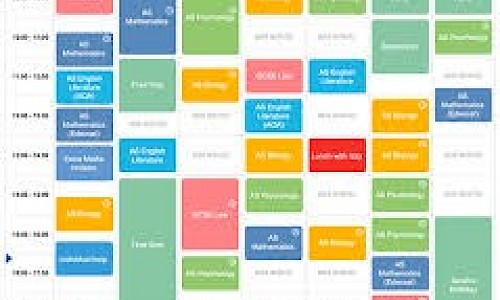May 10, 2024 09:49am
In the termly Student Voice Survey with my A level Psychologists, we focussed on the revision techniques which have been used effectively in past prelim exams and in the lead up to the external examinations.
I hope all our students preparing for end of year tests, GCSEs or A levels benefit from the techniques below.
The students do not use just one technique but a variety, but key was having a daily and weekly schedule, organising their different subjects and the topics which were their priority.
Tellulah, Year 13 "Using past exam papers from exam websites, completing them in timed conditions and then using the exam mark schemes". This technique can be powerful using your green pen review to add details, corrections and write model top band answers. To add challenge, students can complete the questions in timed and silent conditions, preparing for the exam.
Using Personal learning checklists (PLCs) to red, amber and green (RAG) the topics from the exam course you confidently understand, need to review or don't understand, is an excellent starting point for planning revision.
Mimi, Year 13 - "Using the app FLORA which locks your phone to avoid distracting you whilst revising. You can also sync up this app with your friends, who are also revising". This app is useful as it provides a visual image of a tree growing on your phone to represent the amount of time you have been concentrating on your studies. Building up your resilience to focus for longer periods of time in silence is excellent preparation for the longer exam papers. Also, seeing how long your peers are revising for can be a competitive motivator!
Vivian, Year 13 "Completing templates of knowledge and understanding, such as A3/A4 grid of the core studies, assumptions of each psychological approach". Using knowledge organisers and completing faded models or blank versions can provided a clear measure of the content you recall. Using black pen to complete then blue pen to add detail can help rehearse the A01 content.
Lucas, Year 13 "Blurting - to write in timed conditions all I know about a topic, key study or approach". Blurting involves writing down all the information you can remember on a topic (it doesn't matter about the order or if it's correct at the start) then going back to your notes to find out what you've missed or got wrong. https://www.bcu.ac.uk/exams-and-revision
Using SENECA to learn content accurately and track your progress, even if its only 10 minutes chucks, a few times every day on your phone or other device.
Making sure to find a quiet place to study, so that you are in a working environment away from distractions.
Henry, Year 13 "Using the exam question banks available for different papers", most exam boards have a clear structure on the types of questions and assessment criteria, knowing what skills are being assessed and how to demonstrate your knowledge in the limited time.
Asking teachers for help, if not sure about the a topic, they can guide you to the resources on TEAMS, subject textbooks and revision guides. Teachers would rather you asked a question that they can answer in a quick email than you worry needlessly!
Toby, Year 13 "Practicing on-line tests to check for understanding". These can be useful but the danger can be having the discipline to remain focussed on your work.
Kiera, Year 13 "Focussed revision, then testing yourself by completing a timed closed book answer". This technique can be powerful in developing your pace, stamina, conciseness and confidence in exam writing conditions. Also, the answer can be green pen reviewed for accuracy and compared to WAGOLL.
Be honest with yourself, are you using your time wisely and actively working, how do you know that you are effective in your revision?
See the link below from A* students, on their tried and tested methods:
https://www.theuniguide.co.uk/advice/revision-help/revision-exams-making-the-grade
Remember, the wise words of Benjamin Franklin "By failing to prepare you are preparing for failure".
The lead up to the exams is not only about completing revision but also balancing your physical health and mental well being, in readiness for success!


